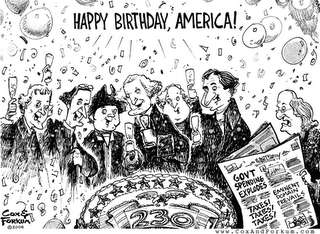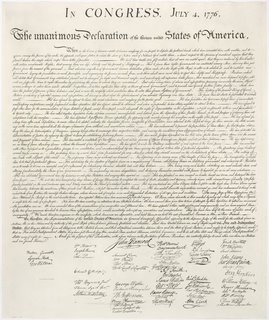 As most New Zealanders won't know, yesterday (our time) was American Independence Day -- and today (our time) it's their time.
As most New Zealanders won't know, yesterday (our time) was American Independence Day -- and today (our time) it's their time.
Why does it matter? Why does it matter to us down here at the bottom of the South Pacific that a bunch of gentlemen over two-hundred and thirty years ago pledged their "lives, fortunes and sacred honour" to erect the first government in history dedicated to the task of protecting individual rights -- as expressed in Thomas Jefferson's magnificent Declaration of Independence, the rights to life, liberty and the pursuit of happiness?
Why should that matter to us? As Michael Berliner explains, "Jefferson and Washington fought a war for the principle of independence, meaning the moral right of an individual to live his own life as he sees fit." The principle of independence for which they fought is universal.
The United States of America was the first and still the only country on earth to be founded upon the specific idea that human life and human liberty are sacred. July 4th is a day when freedom's anthem is heard around the world!
Despite its occasional breaches in upholding the principle of human rights and human liberty consistently, it is for nonetheless for this that we all celebrate (or should celebrate) Independence Day. To found a nation upon the notion that "life, liberty, and the pursuit of happiness" are sacred - to constrain government to act only in defence of those rights - was not just a unique event in human history, it worked like all hell; it worked because protecting those rights gave individuals the moral space, the freedom, within which to act and to flourish. It was not just that this made America and the world freer and more prosperous, it was not just that this protection for liberty gave a platform to criticise and remedy the breaches of the principle; it is it is the illustration that a country founded upon reason, individualism and freedom works. That liberty is moral. That liberty is right.
The Declaration was made on behalf of every human being.
Said Thomas Jefferson in the last letter he was to write, reflecting fifty years later on the Declaration of Independence and the July 4 celebrations that commemorate its signing:
May it be to the world, what I believe it will be (to some parts sooner, to others later, but finally to all), the signal of arousing men to burst the chains under which monkish ignorance and superstition had persuaded them to bind themselves, and to assume the blessings and security of self-government. That form which we have substituted, restores the free right to the unbounded exercise of reason and freedom of opinion. All eyes are opened, or opening, to the rights of man. The general spread of the light of science has already laid open to every view the palpable truth, that the mass of mankind has not been born with saddles on their backs, nor a favored few booted and spurred, ready to ride them legitimately, by the grace of God. These are grounds of hope for others. For ourselves, let the annual return of this day forever refresh our recollections of these rights, and an undiminished devotion to them.Amen. And let those thoughts be heard around the world! For as one commentator said on this day last year, July 4th is not just a National Day for Americans because the Declaration of Independence really is "freedom's anthem heard around the world":
Whenever you hear news of people fighting for democracy, pause and give thanks for the Declaration of Independence. I am thankful every day that by blind luck I was born in this country. I want the whole world to have the comforts and the opportunities that have so enriched my life. When they tear down a wall in Berlin, when an oppressed group is granted a right in Latin America, when a business is allowed to exist in China, a protest is allowed in a former Soviet satellite, a woman attends a school in Afghanistan or a purple forefinger is raised in Iraq, I think to myself, “the world may not know all the lyrics, but they are definitely singing our song.”
 And he's right. America's creation was the great political achievement of the Enlightenment: the full political implementation of the concept of individual rights, with a government constrained to protect them. [What are individual rights, and why do they need the protection of government? Ayn Rand explains. What specifically was the nature of the government the American founding fathers tried to erect? Ayn Rand explains that too.]
And he's right. America's creation was the great political achievement of the Enlightenment: the full political implementation of the concept of individual rights, with a government constrained to protect them. [What are individual rights, and why do they need the protection of government? Ayn Rand explains. What specifically was the nature of the government the American founding fathers tried to erect? Ayn Rand explains that too.]
With the exception of just a few words, the words could hardly be bettered today (although some of us have tried):
We hold these truths to be self-evident, that all men are created equal, that they are endowed by their Creator with certain unalienable Rights, that among these are Life, Liberty, and the pursuit of Happiness. That to secure these rights, Governments are instituted among Men, deriving their just powers from the consent of the governed. That whenever any Form of Government becomes destructive of these ends, it is the Right of the People to alter or to abolish it, and to institute new Government, laying its foundation on such principles and organizing its powers in such form, as to them shall seem most likely to effect their Safety and Happiness...
A wonderful, wonderful anthem to freedom that rings down through the years. If only the real meaning of those words could be heard and undeerstood. As David Mayer says: We hold these truths to be self-evident, that all men are created equal, that they are endowed by their Creator with certain unalienable Rights, that among these are Life, Liberty, and the pursuit of Happiness. That to secure these rights, Governments are instituted among Men, deriving their just powers from the consent of the governed. That whenever any Form of Government becomes destructive of these ends, it is the Right of the People to alter or to abolish it, and to institute new Government, laying its foundation on such principles and organizing its powers in such form, as to them shall seem most likely to effect their Safety and Happiness...
To really celebrate Independence Day, Americans must rededicate themselves to the principles of 1776, and particularly to the absolute importance of individual rights – not the pseudo-rights imagined by proponents of the welfare state, but the genuine rights (properly understood) of individuals to life, liberty and the pursuit of happiness. We must also rededicate ourselves to the Declaration’s standard for the legitimacy of government – a government that is limited to the safeguarding of these rights, not to their destruction – and, with this, an acceptance of the principle that outside this sphere of legitimacy, individuals have the freedom (and the responsibility) of governing themselves.
If Americans are to use this day to re-dedicate themselves to the principles of 1776 as Mayer invites, then non-Americans might use it to take up Thomas Jefferson's challenge "to burst the chains under which monkish ignorance and superstition had persuaded [us] to bind [ourselves], and to assume the blessings and security of self-government."
Human liberty is the most sacred thing in the universe, and today is the pre-eminent day in which to celebrate it, and to salute the authors of America's Declaration of Independence. To America's founders, I salute you!
NB: Some final July 4 snippets for you:
- In one of those historic coincidences that resonates for centuries, 1776 wasn't just the year in which Thomas Jefferson published his Declaration of Independence, it was also the year that Adam Smith published his world-changing book, The Wealth of Nations. Appropriate then that on July 4th the city fathers of Smith's home town Edinburgh have unveiled a statue of the genius. Paul Walker has the details. [And an update.]
- 1,215 servicemen celebrated July 4th Petraeus style, by re-enlisting in a huge ceremony in Baghdad. "Fittingly," says Powerline, "the re-enlistment took place in one of Saddam's former palaces." [Hat tip Jeff Perren.]
- Consider the founders' ringing declaration of unalienable rights to life, liberty and the pursuit of property and happiness with the mealy mouthed suck-up-itude of the Obama clown, who on American patriotism is proud to declare "...the call to sacrifice for the country's greater good remains an imperative of citizenship..." Pause for reflection. As Myrhaf points out, the "call to sacrifice' is the regular call of those in power to make the people voluntarily enslave themselves to the state. "Ideologically, Obama is just the latest mediocre representative of the collectivist counter-revolution to the American Revolution. The American Revolution stood for the Enlightenment values of individual rights, liberty and prosperity. The counter-revolution stands for collectivism, statism and sacrifice."
- For the very best version of Star Spangled Banner to play over a martini, or your Sam Adams, I recommend Licia Albanese's spontaneous combustion at a Mario Lanza ball a few years ago. Fortunately, Lindsay Perigo was on hand to record the eighty-year-old drowning out the young tenor who was supposed to be taking centre stage. Listen here. Magnificent!
- And of course, don't miss the Star Spangled Objectivist blog roundup at Kim's Place.
3 comments:
I really enjoyed that post PC. And happy Independence Day to all those who are Americans - not by birth but by conviction.
Julian
Ah, early America. One of the few societies in history to truly value freedom (others being Ancient Greece, and Medieval Scandinavia).
On the Adam Smith statue I added a couple more pictures and a little more information here
Post a Comment